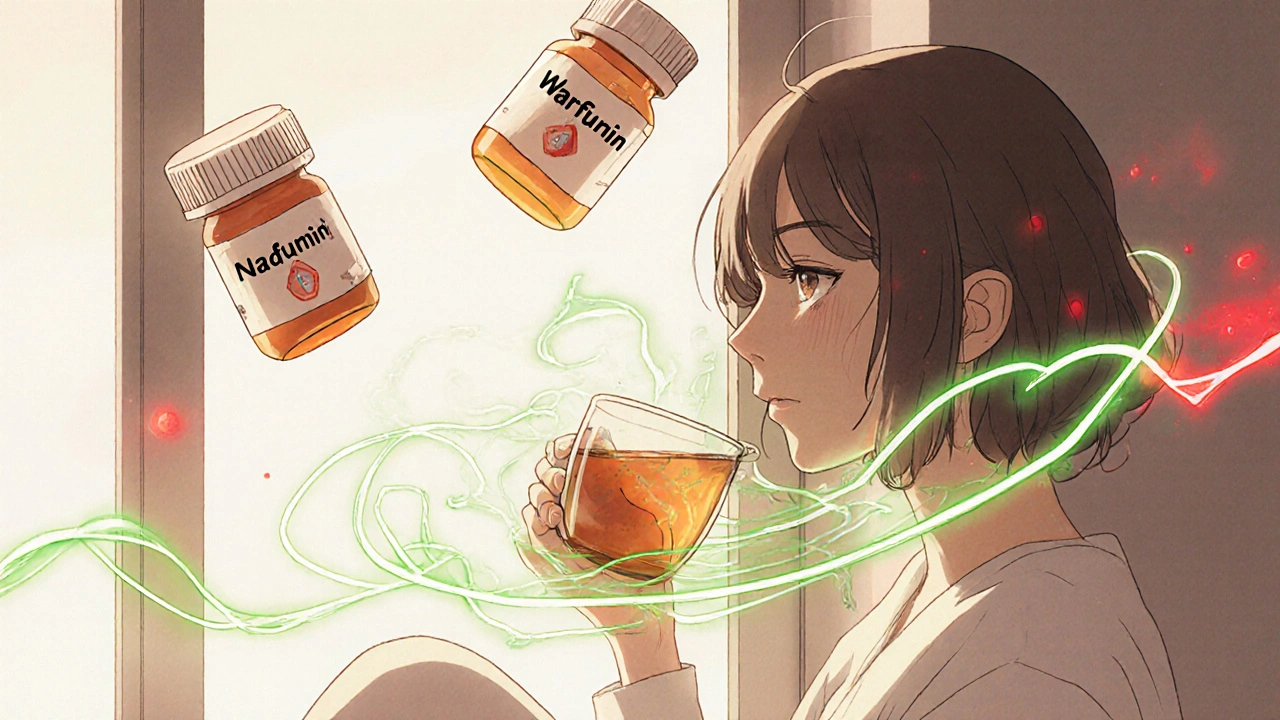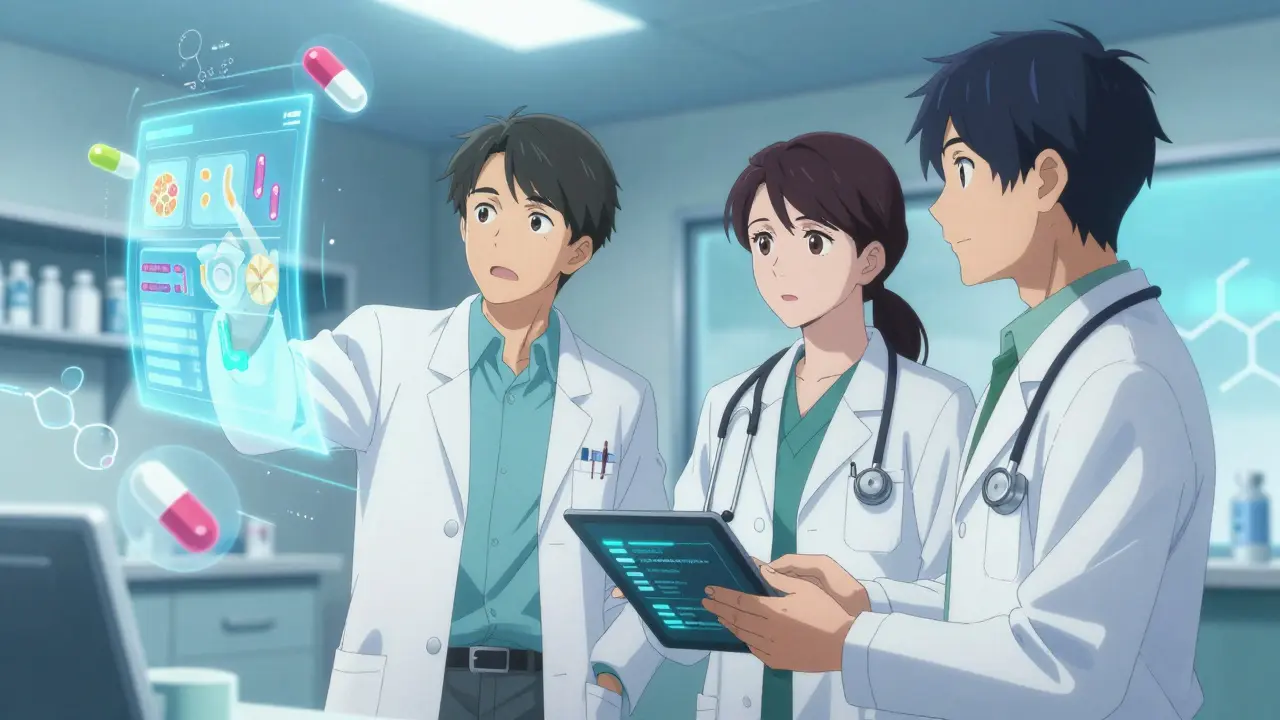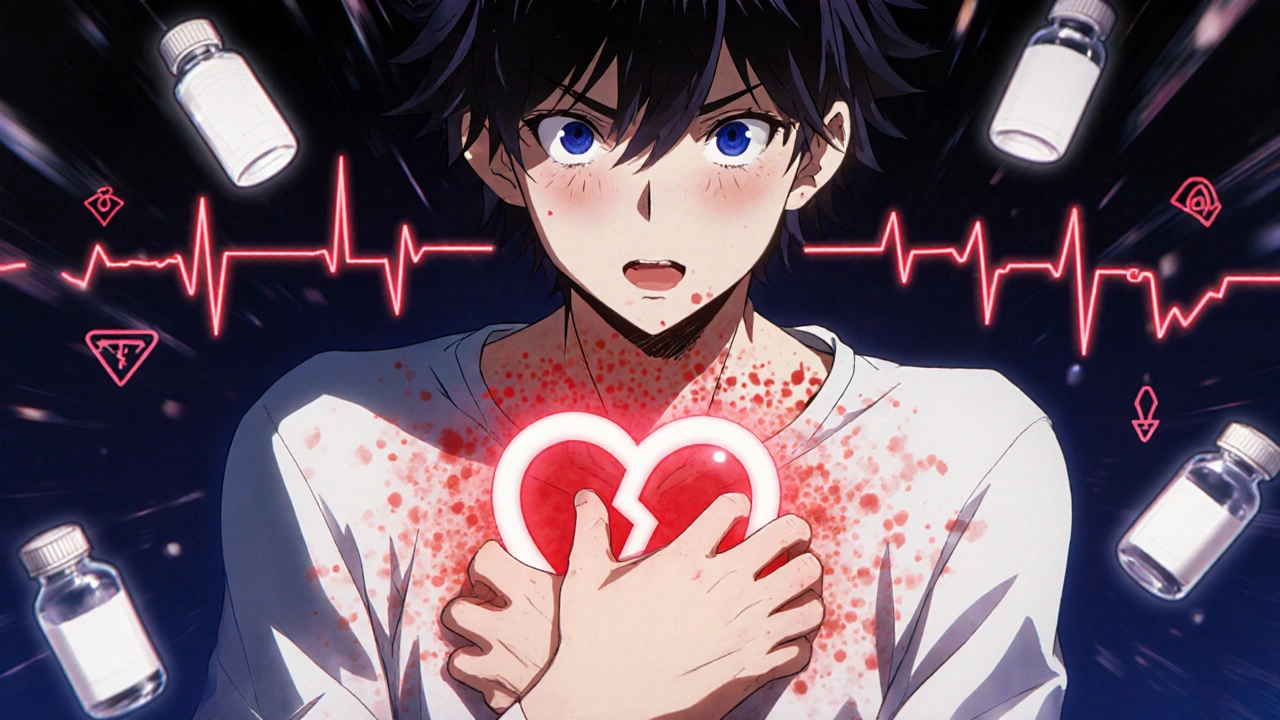Drinking a warm cup of chamomile or hibiscus tea might feel like a gentle way to relax or support your health-but if you’re on medication, that cup could be doing more than you realize. Many people assume that because herbal teas are natural, they’re harmless. But herbal teas aren’t just soothing drinks. They contain powerful plant compounds that can change how your body handles prescription drugs, sometimes with serious consequences.
Why Herbal Teas Aren’t Just Tea
Unlike black or green tea from the Camellia sinensis plant, herbal teas come from roots, flowers, leaves, or seeds of other plants. Think peppermint, ginger, echinacea, licorice, or St. John’s wort. These aren’t flavorings-they’re bioactive substances that interact with your body’s chemistry. And when you’re taking medications, especially those with a narrow safety margin, those interactions can turn harmless rituals into health risks.Take warfarin, a blood thinner used to prevent strokes. If you drink large amounts of ginkgo biloba tea or even chamomile regularly, you might unknowingly increase your risk of bleeding. Studies show these herbs can thin the blood further, making bruising or internal bleeding more likely. The same goes for green tea: while a single cup is usually fine, drinking three or more strong cups daily has been shown to reduce the effectiveness of the beta-blocker nadolol by up to 85%. That means your heart rate and blood pressure could spike because the drug isn’t working like it should.
How These Interactions Actually Happen
Your body breaks down medications using enzymes in the liver-mainly the CYP450 family. Some herbal teas block or speed up these enzymes, changing how quickly your body clears drugs from your system. For example:- St. John’s wort tea activates CYP3A4, which breaks down drugs like cyclosporine, birth control pills, and some antidepressants too fast. This can drop drug levels so low they stop working.
- Green tea contains compounds that inhibit OATP1A2 and P-glycoprotein-transporters that help move drugs like statins and antibiotics into your cells. When blocked, your body absorbs less of the medication. One study found green tea reduced atorvastatin levels by nearly 40%.
- Hibiscus tea acts like an ACE inhibitor, the same class of drugs used to treat high blood pressure. If you’re already taking lisinopril or enalapril, hibiscus tea can push your blood pressure too low, causing dizziness or fainting.
- Goldenseal tea (made from the root) blocks CYP2D6 and CYP3A4, affecting over half of all prescription medications, including painkillers, anti-anxiety drugs, and even some cancer treatments.
It’s not just about what’s in the tea-it’s about how much you drink, how strong it is, and how long you’ve been taking it. A weak cup once a week? Probably safe. A strong brew three times a day? That’s a different story.
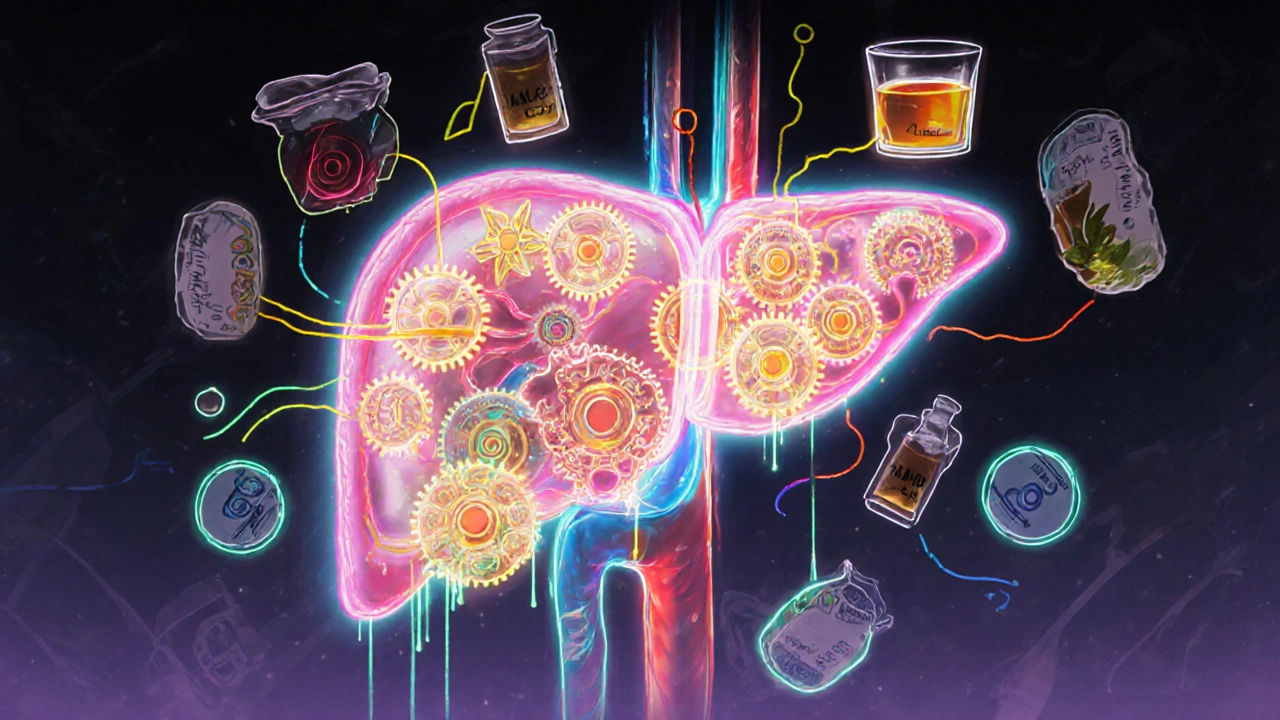
High-Risk Medications to Watch Out For
Some medications are especially sensitive to herbal interference. If you’re on any of these, treat herbal teas like you would alcohol or grapefruit juice-be cautious, and talk to your doctor.- Warfarin (Coumadin): Ginkgo, ginger, garlic, and chamomile can increase bleeding risk. Cranberry tea is controversial-some studies say it raises INR, others say no effect. Better to avoid it altogether.
- Digoxin: Licorice root tea can lower potassium levels, which makes digoxin toxicity more likely. Even small drops in potassium can cause dangerous heart rhythms.
- Cyclosporine: Used after organ transplants. St. John’s wort and green tea can slash its levels, risking organ rejection.
- Theophylline: Used for asthma. Green tea contains caffeine, which can increase the drug’s side effects like rapid heartbeat or seizures.
- Statins (atorvastatin, simvastatin): Green tea reduces absorption, making cholesterol control harder.
- Oral contraceptives: Chamomile may interfere with estrogen metabolism, potentially reducing effectiveness.
These aren’t rare cases. The Mayo Clinic reported that nearly 70% of older adults use herbal products, but only 25% tell their doctors. That gap is dangerous. Your pharmacist might know about your prescriptions-but if you don’t mention your daily hibiscus tea or nightly chamomile, they can’t warn you.
What About ‘Functional’ Herbal Blends?
The herbal tea market is booming. Brands now sell blends labeled for “immune support,” “stress relief,” or “detox.” These often mix 5-10 different herbs in one bag. That’s a problem.Imagine a tea with hibiscus, ginger, turmeric, and licorice-all in one cup. Each one has its own interaction profile. Hibiscus lowers blood pressure. Ginger thins blood. Licorice lowers potassium. Turmeric can affect liver enzymes. Together, they create a cocktail of unknown effects, especially if you’re on multiple medications. There’s almost no research on these combinations. And because herbal products aren’t regulated like drugs, what’s on the label doesn’t always match what’s inside.
One 2023 study found that 30% of herbal tea products sold online contained undeclared ingredients-including synthetic drugs or banned stimulants. That’s not just an interaction risk-it’s a poisoning risk.
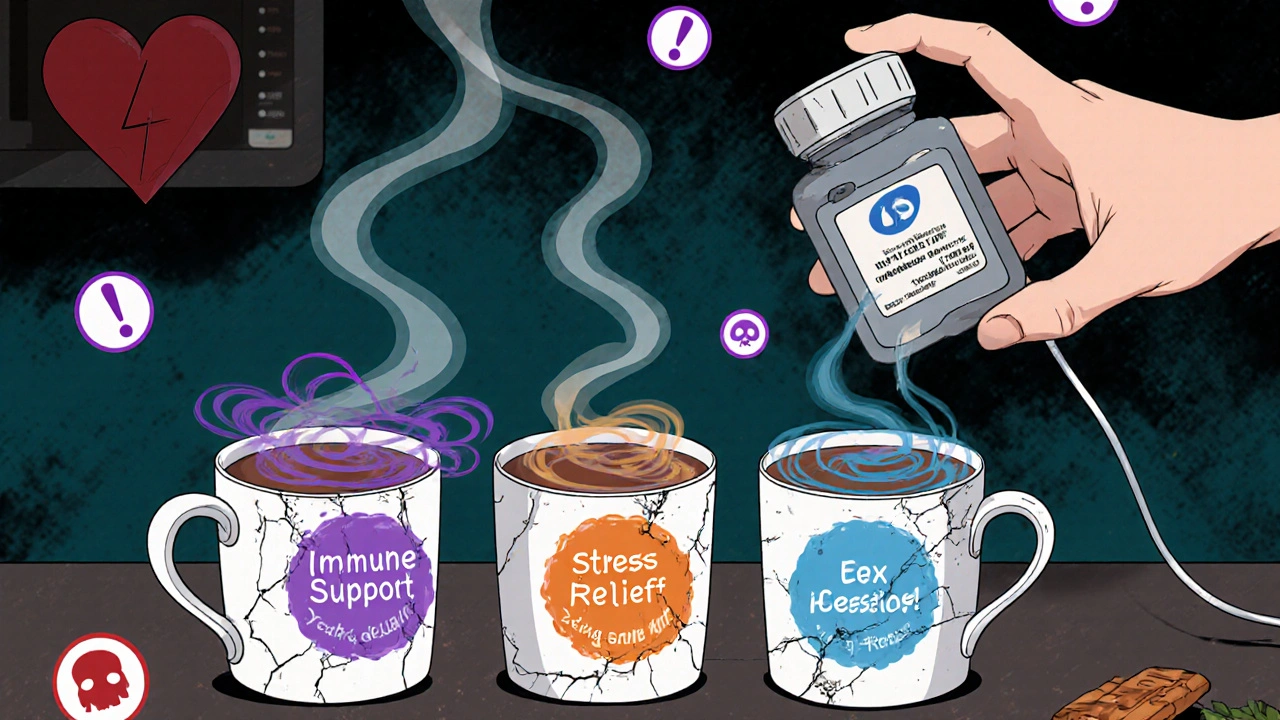
What You Should Do Right Now
You don’t need to quit herbal tea. But you do need to be smart about it.- Make a list. Write down every herbal tea you drink, how often, and how strong. Include any supplements, tinctures, or extracts too.
- Bring it to your next appointment. Don’t wait for your doctor to ask. Say: “I drink this tea daily-could it interfere with my meds?”
- Be extra careful with blood thinners, heart meds, and transplant drugs. If you’re on one of these, avoid new herbal teas until you’ve talked to your provider.
- Watch for warning signs. Unexplained bruising, dizziness, irregular heartbeat, or sudden changes in how you feel could signal an interaction.
- Choose single-ingredient teas. If you want chamomile for sleep, get plain chamomile-not a “calm blend” with 8 other herbs.
The FDA says “natural doesn’t mean safe.” That’s especially true for herbal teas. What’s gentle for one person can be risky for another-especially if you’re older, on multiple medications, or have liver or kidney issues.
When in Doubt, Pause and Ask
There’s a lot we still don’t know. Only about 17% of reported herb-drug interactions have been confirmed in human studies. Most data comes from lab tests or animal studies. That means the real-world risk might be lower-or higher-than we think.But when the stakes are high-like avoiding a stroke, preventing organ rejection, or keeping your blood pressure stable-you can’t afford to guess. Better to pause your tea for a week and check with your doctor than risk a hospital visit.
Herbal teas can be part of a healthy routine. But they’re not harmless. Treat them like medicine-not just a comforting ritual. Your body doesn’t know the difference.

